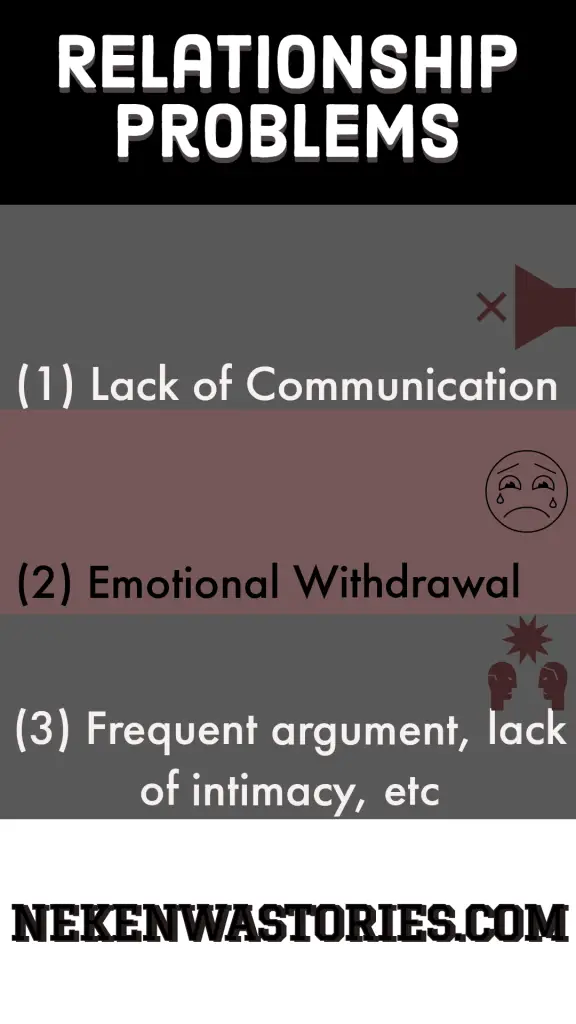Relationships are complex and require effort from both partners to maintain a healthy balance.
However, sometimes things can go wrong, and it’s essential to recognize when there is a problem in your relationship.
It’s normal for couples to face challenges, but ignoring issues can lead to resentment and distance between partners.
Relationship Problems

1. Lack of Communication: One sign of a relationship problem is a lack of communication.
If you or your partner are not sharing your thoughts and feelings, it can lead to misunderstandings and hurt feelings.
2. Emotional Withdrawal: Another indication of trouble is when one partner begins to withdraw emotionally or physically from the relationship.
This can be a sign that they are feeling neglected or unimportant.
3. Others: Other signs of relationship problems include frequent arguments, feeling disconnected from your partner, and a lack of intimacy.
These issues can stem from a variety of sources, such as stress, financial difficulties, or personal problems.

It’s important to identify these problems early on and work together to find solutions before they escalate.
Recognizing relationship problems is the first step towards repairing the rift in your relationship.
By acknowledging that there is an issue, you can begin to take steps to address it and move forward with your partner.
Communication Strategies for Couples
Effective communication is the foundation of any healthy relationship.

Couples need to communicate openly and honestly with each other to build trust, resolve conflicts, and deepen their connection.
However, communication can be challenging, especially when emotions are high or when partners have different communication styles.
One important strategy for effective communication is active listening. This means giving your partner your full attention, without interrupting or judging them.
It also involves reflecting on what you heard to ensure that you understand their perspective. Active listening can help partners feel heard and validated, which can improve the quality of their communication.
Another important communication strategy is using “I” statements instead of “you” statements. For example, instead of saying “You always make me feel ignored,” try saying “I feel ignored when we don’t spend time together.” This approach is less accusatory and more focused on expressing your feelings and needs.
It’s also helpful for couples to establish ground rules for communication, such as avoiding name-calling or yelling. By setting clear expectations for how they will communicate with each other, partners can create a safe and respectful environment for discussing sensitive topics.
Finally, couples need to practice empathy and understanding towards each other. This means putting yourself in your partner’s shoes and trying to see things from their perspective. It also means acknowledging and validating your partner’s feelings, even if you don’t agree with them.
By using these communication strategies, couples can improve their ability to connect, resolve conflicts, and strengthen their relationship.
Rebuilding Trust in Your Relationship
Trust is a crucial component of any healthy relationship. However, it can be easily broken due to various reasons such as infidelity, dishonesty, or other forms of betrayal.

Once trust is broken, it can be challenging to rebuild it. But, it’s not impossible. Rebuilding trust requires patience, effort, and commitment from both partners.
The first step towards rebuilding trust is acknowledging the hurt and pain caused by the breach of trust.
The partner who has broken the trust needs to take responsibility for their actions and apologize sincerely.
It’s essential to understand that an apology alone won’t fix everything. It’s just the beginning of the process.
Next, the couple needs to have open and honest communication about the incident and its impact on the relationship.
The betrayed partner needs to express their feelings and concerns, while the other partner needs to listen without getting defensive.
Both partners need to work together to identify the root cause of the issue and find ways to prevent it from happening again.
Consistency is key when it comes to rebuilding trust. The partner who broke the trust needs to demonstrate through their actions that they are committed to making things right.
They need to follow through on their promises and be transparent in their behaviour. This may involve sharing passwords, being accountable for their whereabouts, or checking in regularly.
Finally, it’s important to remember that rebuilding trust takes time. It’s not something that can happen overnight. Both partners need to be patient and understanding with each other throughout the process.
With effort and commitment, it’s possible to repair the rift and build a stronger, more trusting relationship.
Managing Conflict and Disagreements
Every relationship has its fair share of disagreements and conflicts. It’s normal to have different opinions and perspectives, but it’s important to manage these situations healthily.

Here are some tips for managing conflict and disagreements with your partner:
1. Listen actively: When your partner is expressing their concerns or frustrations, listen attentively without interrupting them. Try to understand their perspective and validate their feelings.
2. Use “I” statements: Instead of blaming your partner, use “I” statements to express how you feel. For example, say “I feel hurt when you don’t acknowledge my efforts” instead of “You never appreciate anything I do.”
3. Take a break: If the conversation becomes too heated, take a break to cool down. Agree on a time to resume the conversation when both of you are calm.
4. Find common ground: Look for areas where you both agree and build from there. Focus on finding a solution that works for both of you.
5. Avoid personal attacks: Name-calling and insults will only escalate the situation. Stick to the issue at hand and avoid attacking your partner personally.
6. Seek compromise: Relationships require compromise. Be willing to meet your partner halfway and find a solution that works for both of you.
Remember, managing conflict and disagreements is an ongoing process. It takes practice and patience, but with effort, you can learn to handle these situations healthily and constructively.
Prioritizing Intimacy and Connection
Intimacy and connection are essential components of a healthy relationship. However, it’s not uncommon for couples to experience a decline in intimacy over time.

This can be due to various reasons such as stress, busy schedules, or unresolved conflicts. Whatever the cause may be, it’s important to prioritize intimacy and connection in your relationship.
One way to do this is by setting aside dedicated time for each other. This could be a weekly date night or even just a few minutes of quality time every day.
During this time, make an effort to connect with your partner emotionally and physically. Put away distractions like phones and TV and focus on each other.
Another way to prioritize intimacy is by being open and honest about your needs and desires. Talk to your partner about what makes you feel loved and appreciated.
This could be anything from physical touch to verbal affirmations. By communicating your needs, you can work together to create a more fulfilling and intimate relationship.
It’s also important to remember that intimacy doesn’t always have to be s3xual. Small gestures like holding hands, cuddling, or even just sitting close to each other can help strengthen your connection.
Prioritizing intimacy and connection takes effort and intentionality, but it’s worth it for the health and longevity of your relationship.
Seeking Professional Help for Relationship Issues
When it comes to relationship problems, seeking professional help can be a game-changer.

Sometimes, despite our best efforts, we just can’t seem to make progress on our own. That’s where a trained therapist or counsellor can come in.
Professional help can take many forms, from couples therapy to individual counselling. The key is finding a provider who is a good fit for you and your partner.
Look for someone who specializes in working with couples and who has experience dealing with the specific issues you’re facing.
One of the benefits of seeking professional help is that you’ll have a neutral third party to guide you through difficult conversations and provide objective feedback.
A therapist can help you identify patterns in your behavior and communication that may be contributing to the problem, and offer strategies for making positive changes.
It’s important to remember that seeking professional help doesn’t mean you’ve failed as a couple. It takes courage and commitment to acknowledge that you need outside support.
With the right guidance, you and your partner can work through your issues and emerge stronger and more connected than ever before.

